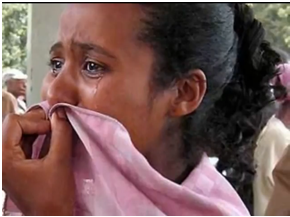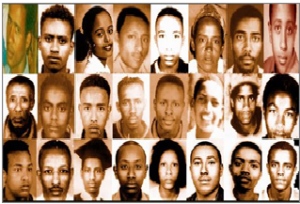Meles uses brute force at home and a massive PR machine abroad to crowd out the opposition and to hide his evil empire. Until their fall many evil geniuses like Ivan the Terrible, Pol Pot, Idi Amin, and Leopold II of Belgium exhibited similar behavior.
Internationally, far too many individuals have become unintentional victim and a party to the Ethiopian untold tragedy. Meles has on his side notables like, Joseph Stiglitz, Paul Krugman, Donald Levine, Dick Army, Nancy Polesi (via Richard Gephardt), Senator James Inhofe and more.
He has hired who is who in America to parlay non-existing achievement. He has become a modern alchemist, who invents something out of nothing, higher GDP in land of abject poverty and starvation, democracy in land of oppression .
Meles sounds great on many fronts on prima facie; however, further scrutiny it turns out that he has been a disaster for Ethiopia in many areas: economy, national integrity, national unity, social cohesion, and hope for the new generation.
Unraveling his economic system shows it is built on wrong statistics and baked to control the country by creating an illusion of progress, false nationalism, especially by antagonizing Egypt and Eritrea and by engaging in the construction of the Nile Dam, which is a gigantic misuse of resource that will unravel sooner or later.
Meles’s 20 year rule will leave a huge cleavage of cicatrize of a scar that will never heal from the wedges he promoted, from making Ethiopia landlocked, and from driving the economy into the shades in his attempt to enrich his clan, with little empathy for the rest of Ethiopia.
Despite Meles’ rhetoric about transforming Ethiopia, Ethiopia was found to be one of the failed states following countries like Somalia, Chad, and others.
Meles besides putting or wasting Ethiopia’s meager resources in Tigre in projects that have no investment merits such as Wind Turbine ($220 million Euro), the failed
Tekeze hydroelectric dam ($360 million dollars), and planned Rails from Djibouti to Mekele, has nothing to show for his last 20 years of wretched rule. This also vindicates those of us who always stated that he is leading Ethiopia not only to a failed estate, but close to an economic Armageddon (see Voodoo economics..) at http:www.ethiodemocat.com.
The Index published by Foreign Policy magazine and the Fund for Peace found that Ethiopia is critically in danger of becoming a failed estate based on demographic pressure, refugee flows, group grievances, human rights violations, uneven development, economic decline, and the continued deligitimization of Ethiopian nationalism. The most vulnerable states next to Ethiopia are Somalia, Chad, Sudan, the Democratic Republic of Congo and Haiti.
None of these countries have such a flamboyant and arrogant leader like Meles, who brags about a fabricated GDP growth data to keep his wretched rule and continued economic decline of the wretched country.
Though Ethiopia is the birth place of humanity and one of the cradles of civilizations, but for the last four decades, it has been one of the most wretched place on earth with little hope of reversing that scenario given the current leadership of the country.
There is no place on earth who has taken greater abuse by nature and abuse by dictators like the Ethiopian people. Despite facing major resource constraints as demonstrated by constant famine and drought, in 1991 the country was declared land locked by Meles with the secession of Eritrea, making the country worse off and dependent again on one of its former possessions, now independent state of Djibouti.
There is no one on earth who has taken greater abuse from nature and abuse from dictators like the Ethiopia people.
With the arrival of Meles, secessionist and anti-Ethiopian force overwhelmed the national government and took over power, thus misdirecting resources, destroying institutions and promoting ethnic and religious division once a very cohesive nation.
To stifle further the country’s economic growth, Meles decided to create ethnic blocks likes in Apartheid South Africa, thus creating tensions and making commerce almost impossible, cutting existing trades relations, while Europe was forming the European Union and the U.S. was pushing the North American Free Trade Agreement. In Ethiopia small traders, primarily Gurages were massacred and their possession ransacked by ethnic groups aligned with Meles.
To add insult to injury, he confiscated land and denied access to technology for the majority, except in Tigre where Mekele University and Mekele Institute of Technology (MIT) are provided unfettered access and grants.
The advent of Internet and technology as a whole was heralded by some as a panacea to ending not only the economic divide between the have and the have-nots, but also between the developing countries and the developed world. Unfortunately, Ethiopia was left out by design by Meles because Meles was afraid that technology will be used to organize against him by the majority of Ethiopians as it happened in North Africa and elsewhere.
Ethiopia void of access to technology, void of free market and good leadership is toiling on the brink of economic disaster that will lead to further starvation and famine beyond the current 13 or more million people being fed by World Food Program.
Ethiopia needs an industrial policy that will move it from an agrarian society to a technology driven society. The normal course was from Agriculture, to manufacturing, and industrialization, but with the right leadership, technology makes it possible to move to technological society by skipping all the other steps and create a higher standard of living.
Technology or reengineering has been the most important productivity tools for economic growth, however, like land it is controlled by the government. In Ethiopia technology is primarily used for spying on Ethiopians and blocking websites. Access to technology is correlated to a higher standard of living for current and future generation. Government ownership of land, denial of access to technology, being landlocked remain as a major road block to rapid economic growth. Land ownership of the state is not for any altruistic reason, it is primarily to manipulate the political currents and to keep the majority of Ethiopians who rely on agriculture a hostage.
Despite creating these roadblocks, Meles has stated that the Ethiopian economy will grow 11-14.5 % in the next five years. No landlocked country or no country in Africa, especially a country estranged within by lack of free market, lack of access to technology, respect for property rights and human rights or forced into tribal polarization can enjoy such phenomenal economic growth.
According to data provided by Meles to the CIA and World Bank, Ethiopia’s GDP per capita was close $100 in 1991 when Meles starting ruling the country. Now, it is reported to be $900, a nine fold increase which is much better than what China enjoyed in those periods.
China’s growth is driven by manufacturing and education, but in Ethiopia manufacturing has not changed much for the last 20 years. Education has lost ground with the introduction of ethnic education, where the majority of ethnic groups are encouraged or forced to use their own ethnic language without requiring them to learn the official language; a recipe for disintegration of the country.
How does Meles gets away with such statistical abnormality and cruelty. My guess is like other evil geniuses from Pol Pot, Ivan the Terrible, or Idi Amin; it takes time to unravel such evil doers. However, I would like to compare Meles with another evil genius, Leopold II of Belgium who committed murder and looting of the Congo from 1865-1909. Leopold II was the most brutal ruler of Congo, he controlled a country many times the size of Belgium as
his personal domain through his private army, like Meles. Luckily, he was eventually forced to end his evil rule after the conscience of the Western world could not bear it any more.
Dula Abdu writes on economics, finance, and real estate. Currently, runs his own real estate investment company from Texas.



 By Ethioguardian
By Ethioguardian USA
USA 
